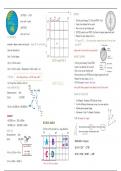Summary
Summary GEOGRAPHY MAP WORK - Calculations, Analysis and More
- Course
- Geography
- Institution
- 12th Grade
Map work skills in just three pages with a practice map too! Includes answering tips and example questions Covers: co-ordinates, reference number, distance, bearing, magnetic bearing, magnetic declination, gradient, cross-section, vertical exaggeration and how to read a map
[Show more]



